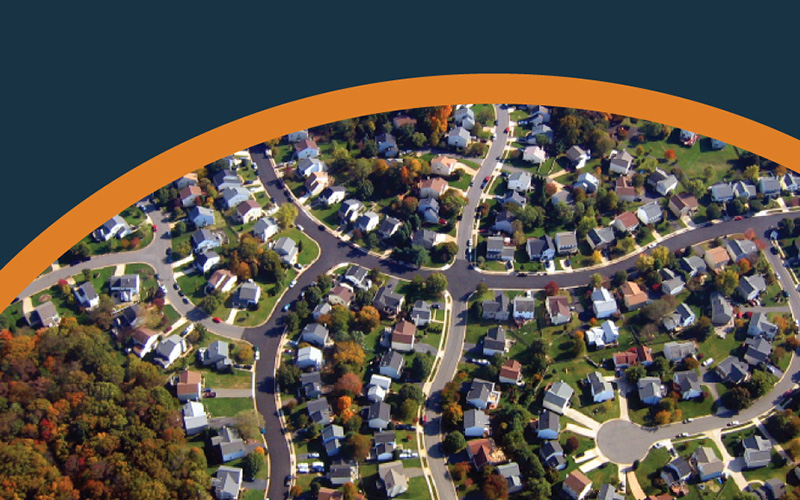Workforce Housing Info Session Offers Valuable Insights
Posted by Alyse Knudsen on June 24, 2024

On June 13, GoWest Foundation hosted a Workforce Housing Information Session to highlight foundation grants and current credit union collaborations focused on meeting housing needs in communities across the region.
Sharee Adkins, GoWest’s Chief Impact Officer and Foundation Executive Director, kicked off the session by explaining how the foundation defines workforce housing, which falls in the middle of the housing continuum. For workforce housing grant-making purposes, GoWest Foundation focuses on supporting members of the community who are between 60-140% of the area median income (AMI), the “missing middle” to whom housing is often unattainable. “There can even be regionally specific components in places like resort communities,” said Adkins.

“We think that there is a unique opportunity for credit unions to partner with the foundation to help leverage and extend the work you’re already doing,” Adkins told the credit union participants before diving into discussions about the foundation’s workforce housing planning and implementation grants and recent credit union projects.
Three credit unions then shared their experiences working with the foundation to create workforce housing projects in their communities.
NuVista Federal Credit Union
NuVista Federal Credit Union is located on the Western Slope of Colorado, serving a five-county area. With approximately $144 million in assets and 7,500 members, “NuVista is not large by any means,” began BJ Coram, CEO of NuVista. The rural counties NuVista serves are located between two resort communities which presents some challenges for housing. As a full-service, CDFI-designated credit union, NuVista wanted to see what else they could do in their communities to expand services and their impact.
NuVista’s region ran into several factors affecting affordable housing, including mountainous terrain that made construction difficult and expensive resort communities where workers could not afford to purchase homes. COVID brought many new residents to the area because of the good local infrastructure, broadband connection, easy social distancing, and home prices that non-locals could afford. This, however, created low inventory and expensive sales prices that deeply affected locals.
“We reached out to all of our city managers, county managers, housing authorities, nonprofits, just about anyone that we could to say, ‘Here’s who we are, what we want to do, and how can we help,’” explained NuVista’s Director of Grants and Special Initiatives, Sara Plumhoff. One of those conversations was with the Home Trust of Ouray County, a small nonprofit community land trust that had several projects happening in the region, including a duplex project within NuVista’s service area in Ridgeway, Colo. The land trust was having difficulties finding a lender who could help them with a construction loan as well as a lack of local long-term leasehold mortgage products that would enable community members to purchase homes built by the land trust.
“We met with them and had a shared vision,” continued Coram. “We felt that they were a really good partner, but we’re a smaller institution and the $800,000 loan was a little bit larger for us. To offset some risk associated with no personal guarantees and a lack of other underwriting mechanisms that we would normally fall back on, we felt that the GoWest Foundation was a great opportunity for us to start and open this partnership.”
GoWest Foundation provided a $100,000 grant that was used for a combination of loan loss reserves and funds to offset closing costs and interest rate subsidy, as well as launch long-term leasehold mortgages. “Our goal was to try to keep this loan request as inexpensive for the home trust as we could because ultimately those savings are passed on to the purchaser of the units,” said Coram. “Our whole approach has been, how can we help on the front side with development and inventory and then also what can we provide the end user or the purchaser? We’re trying to help on both sides.”
Vantage West Credit Union and Tucson Credit Unions Collaboration
“Housing values and affordability are out of reach for a lot of people,” shared Jon Bruflat, VP of Community Impact for Vantage West Credit Union, which is headquartered in Tucson and serves the entire state of Arizona. “We had a regional housing summit, and GoWest Foundation was instrumental in bringing people together, including some community nonprofits and our local city government.”
Out of the summit came a group of six credit unions – Hughes Federal Credit Union, Pima Federal Credit Union, Pyramid Federal Credit Union, Tucson Federal Credit Union, Tucson Old Pueblo Credit Union, and Vantage West Credit Union – that decided to focus on creating accessible mortgages that are 100% loan-to-value (LTV). “We collectively agreed to [design] a product and term sheet and then we will all originate our own [mortgages] as a collective,” Bruflat explained.
GoWest is providing a $200,000 grant that will support this initiative through loan loss reserves so the credit unions can take more underwriting risk. This grant is anticipated to leverage $30 million in lending over five years, serving about 150 families . The reserve will cover mortgage losses during the first five years of their term, after which time, the loss risk is a lot lower.
Collectively using resources from all the Tucson-based credit unions , along with the GoWest Foundation grant, they are able to make a greater impact in the community versus competing with each other over individual mortgages. “It’s really a group effort and has been exciting to see everyone come together to do something good,” Bruflat added. This program is anticipated to launch by late summer 2024.
Consolidated Community Credit Union
About six years ago, after Portland, Ore.-based Consolidated Community Credit Union (CCCU) became CDFI-designated, they had a member reach out about building an accessory dwelling unit (ADU). At the time, they were not very familiar with ADUs but knew that the City of Portland was waving all system development charges for people to build ADUs.
CCCU was awarded a planning grant from GoWest Foundation and decided to hold an ADU summit, inviting 40 people to gauge interest in ADUs. “I thought, man, we’ll be lucky if 10, maybe 20, show up. All 40 people we invited showed up – ADU builders, architects, real estate agents, title companies, anybody we could think of,” shared Larry Ellifritz, CEO of CCCU. “There were 284 permits basically committed, sitting there waiting to be funded, waiting to be built. So we came up with a program based on the feedback that we got from the attendees.”
After this success, CCCU applied for a project implementation grant and received $90,000 in loan loss reserves from GoWest Foundation to create ADU loans and launch Individual Taxpayer Identification Numbers (ITIN) mortgage loans.
CCCU has funded more than $16 million in home improvement and ADU loans over the last four years as a result of their ADU program. “Without the grant from the foundation, I don’t think we would have gone down that road,” Ellifritz continued, “but it was an amazing outcome. In less than a year, we had Portland State call us and say, ‘We heard you’re the expert in ADUs, and we want you to come and speak at our housing symposium.’”
“We just crossed $20 million in ITIN mortgage loans,” Ellifritz shared. “So, we’ve had some very significant success. We haven’t had — knock on wood — one delinquent loan or one charge-off in the space of doing these loans over the last five years!”
Best Practices and Takeaways
The informational session garnered comments about how credit unions can better understand what their communities need and how GoWest Foundation can help.
Participants shared:
- A big part of lending is listening to the market, being aware, and hearing what people need.
- Instead of reinventing the wheel, recraft the wheel. You can model your program on an existing program but expand upon it or adapt it to fit your community’s needs.
- Go out and listen to the community, leverage your resources, and develop a network. Always tell the story that your credit union is there to help.
- Grants give you a shot of courage to get you to do what you should probably be doing anyway.
- Start everything off as a pilot program so if it fails and you have to change or discontinue it, it wasn’t anything that was ever permanent.
- There is a lot of funding tied to AMIs. It is appreciated that GoWest’s workforce housing initiative has a higher AMI so you can include people with middle income – a higher income than programs that focus exclusively on lower income households
GoWest Foundation offers:
- Workforce housing planning and implementation grants.
- Collaboration facilitation with philanthropic organizations and credit unions to support the workforce housing needs of specific communities.
- Guidance to credit unions in an effort to create multi-credit union collaborations.
- Advice and counsel on project ideas before, during, and after implementation. Pick up the phone or email the GoWest Foundation team if you have ideas or want help with grant planning.
- Grant guidelines and resources HERE.
Credit unions can have a powerful impact when working together. While affordable workforce housing will continue to be an issue across the country, GoWest Foundation is committed to helping credit unions create programs that will positively affect communities in the West. Contact the Foundation Team at [email protected] to learn more or connect about your project ideas.
Posted in Community Impact, GoWest Foundation, Thought Leadership, Top Headlines.
















